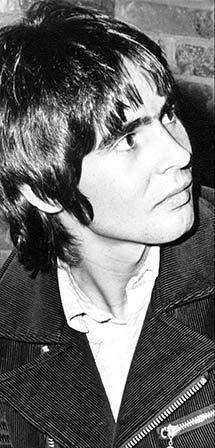The death of Davy Jones, the most popular member of the singing group, the Monkees, at age 66 was shocking.
Who knew he was 66?
Who knew that even Monkees could age and become vulnerable to all the dangers of old age, like the heart attacked that felled Jones?
The Monkees — Jones, Mickey Dolenz, Michael Nesmith and Peter Tork — were in their brief time absolutely huge, and they were unique. In the time of the Beatles, the Rolling Stones, Janis Joplin, Jimi Hendrix, the Doors and the Beach Boys, the Monkees were a totally manufactured — after much auditioning — rock group made for television — literally. “The Monkees” was a quirky, big-hit, half-hour television show, right in the middle of the glory days and haze of 1960s’ rock and roll.
In a way, the Monkees, who looked like very early unscruffed Beatles, adorable as panda bears, were antidotes to the hippie-blues world of drugs, sex and rock and roll that prevailed during their two-year stay on television from 1966-1968. “We don’t like to put people down” was part of their anthem sound, nor, apparently did they have truck with groupies (thousands of screaming girls were part of their live act), drugs, booze or politics. They were energized, electric, nice guys with nice voices, whose energy was infectious, it had a sweet delirious quality to it that was reminiscent of the Richard Lester Beatle films like “Help!”
Hardcore rock-and-roll critics, who found the boys wanting in seriousness, content and rebelliousness, pretty much dumped on them, although hordes of fans embraced them. It should be noted that in one year, the Monkees had record sales that topped the combined efforts of the Beatles and the Rolling Stones, a considerable achievement.
The Monkees rolled out hit after hit, including “Hey, Hey We’re The Monkees,” the theme song of the show, “I’m a Believer” and “Daydream Believer.”
Jones, easily the best known of the quartet, never stopped performing, without or without his mates. Although the group as a whole had a faintly British trope to them, Jones was the only actual Englishman, who once played the Artful Dodger in a Broadway production of “Oliver.” Story has it that the cast played the Ed Sullivan Show the same night that the Beatles rocked the American world.
Jones was born in Manchester, England, which eventually became a title for a rock song. The Monkees may not have been great singers, but they achieved great and huge pop status, with their own inimitable combo of personalities. They were the softer side of rock and roll in the 1960s and 1970s, much like Herman’s Hermits, with impossible to get-out-of-your-head songs (“I’m Henery the Eight, I am” in the Hermits’ case).
We interviewed Peter Noone, the Herman of the Hermits, once when he toured with a production of “Pirates of Penzance” at the National Theater. In one of those unaccountable moments of sheer blank stupidity, I asked him “what was it like being a Monkee?” After what seemed like a very long no-place-to-hide silence, Noone, with good humor, acknowledged that he was in fact a Hermit, not a Monkee.
John Stewart, a former member of the legendary folk group, the Kingston Trio, wrote “Daydream Believer,” when he was living in Marin County outside San Francisco in the 1960s. A rugged singer with Kristofferson charisma, he recorded his own version, which was rueful, romantic, a paen to loving and living young and hardscrabble; it sold few copies, The Monkees turned it into a huge hit, transforming it instantly into a “Sweet Caroline” of memory. They’re the reason most remember the lyrics: “Cheer up, sleepy Jean. Oh, what can it mean. To a daydream believer and a homecoming queen.” Stewart made a nice career for himself singing about regular American folks around the country, including on Bobby Kennedy’s campaign trail, until his death a few years ago. Stewart probably didn’t complain much, given the royalties.
Stewart and Jones were both daydream believers and both gone now.


